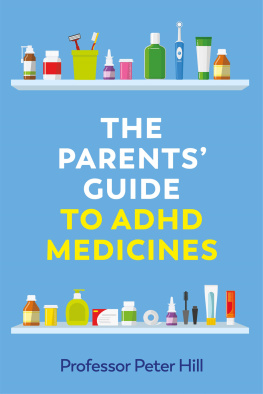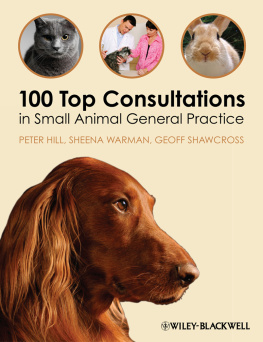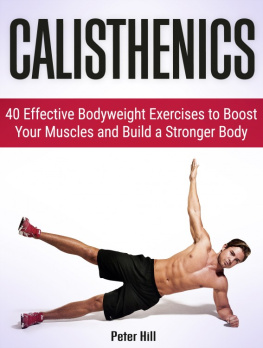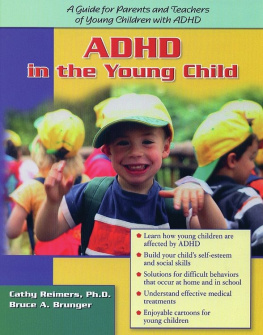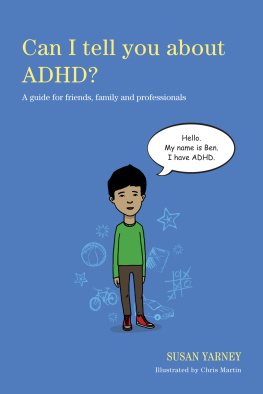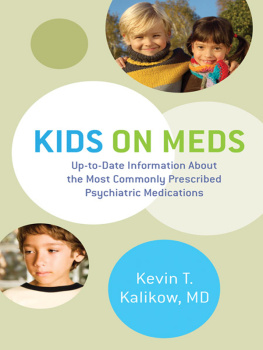Contents

The Parents
Guide
to ADHD
Medicines
PROFESSOR PETER HILL

Contents
Introduction
WHAT THIS BOOK IS ABOUT AND WHY
I THOUGHT I COULD WRITE IT
About this book
This is a book for anyone who wants to read about the medicines for attention deficit hyperactivity disorder (ADHD), when these are used for children and teenagers. It has its origins in talks I have given to parents of children with ADHD. I hope that some of it will apply to adults, although it is written with the under-18s in mind. Although most of my work is with the under-18 age group, I do also treat a number of young adults I had treated through their childhood and who have continued with me whilst at university or college. I have tried to write it for parents, but I hope that some young people will read it too, and that it proves useful for teachers and clinicians.
I hope this book will provide parents of children and teenagers with ADHD with the information they need to understand why their child has been prescribed a medicine, and equip them with enough information to be able to talk about medication with whoever has prescribed it. In other words, I hope it will empower parents in discussion with the doctors and other prescribers who are treating their childs ADHD. They should also be well placed to explain ADHD medicines to their children.
As you can see from the Contents page, I have divided the book into three sections:
explores the essential issues that apply to all medicines, the language used when discussing them and how they are developed. Then I consider how ADHD medicines help the individual and their brain. After that I write about how we know that medicines work, and follow that by some general thoughts about side effects, because I know that this is what parents always ask me about.
has something on each of the medicines used for ADHD in children.
In I deal with the practicalities of treatment and using ADHD medicines. This includes the daily hassles of giving and taking medicines as well as the detail of starting them, keeping going and stopping them. I round off with a chapter on the questions I am often asked when talking to individual families or audiences of parents or teachers.
I would like to think you can dip in and out of these parts and chapters without having to read the book through from start to finish, although there is an advantage in reading first because of the professional terminology used in anything to do with medicines.
I have left out the detail on brain physiology and put it into a separate appendix (see Appendix 1) which is not compulsory reading as it can be hard going if you dont have a scientific background.
Why I thought I could write this book
I should explain why I think I am able to write about ADHD medicines, although I find it rather embarrassing to dwell on my experience and skills.
I am a medical doctor and a consultant (a senior specialist) in child and adolescent psychiatry. For over 40 years I saw patients in the UK National Health Service (NHS), but nowadays I work independently and privately because what I want to do is simply see patients and do a bit of teaching. Much NHS work for consultants is to do with meetings and management, and I have had more than enough of that.
I started work as a mainstream hospital doctor and have special qualifications in general hospital medicine and paediatrics as well as psychiatry. This means that I am experienced in the general use of medicines, although this is not the only thing I do, and I actually prescribe medicines for only about half of the children and young people who are my patients. I should add that although many of my patients have ADHD, I see a wide range of conditions.
When thinking about how I will treat ADHD, I consider the full range of the treatments in which I have trained. These include not only medication but also psychotherapy, family therapy and cognitive behaviour therapy as well as educating people about health issues and family life using my general and specialist medical knowledge.
Having been appointed as a university professor of psychiatry as well as being a qualified doctor, I have a considerable amount of academic, scientific and research knowledge. I have written or helped others to write a number of articles, books or reports on childrens psychological medicines, and for many years I had a special interest in the safety of medicines for children. I have advised the major authorities that approve and regulate medicines in the United Kingdom (the Medicines and Healthcare products Regulatory Agency, MHRA) and Europe (European Medicines Agency, EMA), and worked with the United States Food and Drug Administration (FDA) when I was helping with the development of a new medicine (not for ADHD). From time to time I have acted as an expert witness in the courts, in England and in Europe, when there is a case involving childrens medicines.
I am often asked to lecture about ADHD and medicines. Its part of my work and I enjoy it. I have attended, lectured or advised at meetings sponsored by all the main companies who make medicines for ADHD; I dont favour any one over the other or use their medicines more than is justified by the facts. As I now work as a private consultant, however, I charge fees to the families I see (or to their insurance companies); I dont sell medicines or make a financial profit from prescribing them.
Im very aware that different ADHD medicines are available in different countries. In particular there is an enormous difference between the USA and just about everywhere else because the number of children who will be treated for ADHD is greater in the USA, so that is where companies will market their medicines first. In this book I describe American ADHD medicines, but my focus is mainly on what is available in the UK because this is the place I am most familiar with, although in my work I have travelled quite widely and know something of what goes on elsewhere.
In this book I have used the word child as shorthand for anyone under the age of 18. I appreciate that many teenagers do not like being referred to as a child, but I think that to say child or teenager or child and young person on every occasion is just too long-winded. I hope that those over the age of 12 will not be offended too much.
Whilst I have tried to be reasonably gender-neutral, I have frequently lapsed into using him to refer to a child with ADHD simply because most children being treated for ADHD are male. Girls with ADHD are indeed less common in the general population than boys with ADHD, but, more importantly, they are less likely to be referred to services for a diagnosis. Being a girl or a boy does not mean there is a difference in the way they are treated with medicines unless a girl is pregnant, in which case everyone is going to be careful.
May I make what seems to me an important point about medicines for ADHD? They are not cures. What they do is make it more possible for someone with ADHD to manage their life and for other people to look after and teach them. They are meant to be helpful to those who take them, and they are not chemical coshes, prescribed simply to quieten children down and make life easier for parents and teachers. I hope this will become clear from some of the stories about patients I have included. By the way, although all these stories are genuine, I have changed names and details so that patients cannot be identified.

